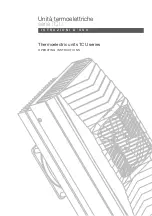
3
1. ESSENTIAL SAFETY REQUIREMENTS
Manual operated LARZEP lifting tables F005121 and F01571 have been designed to lift maximum loads of 500 and 1500 kg. They have 4 wheels, two of them
fixed to the table and two movables. Vertical lift is 675 mm for the single scissor (F01571) and 1285 mm for the double scissors (F005121).
These lifting tables have been designed, manufactured and tested following UNE-EN 1570 standards.
They allow elevation of big loads under risks that have been foreseen by the manufacturers.
Mechanical risks: These lifting tables have been designed to support only their set up nominal loads. They have a safety valve to avoid overloads. If the load is
placed over the table ones it has been lifted, user should know how heavy this load is; because overloads could deform or even break mechanical components,
with a risk for the table and for the user.
Crushing risks: If the hydraulic systems brakes, the lifting table could suddenly fell down and cause crushing damages to the user who is working inside the
scissors mechanism. Because of that, user should never introduce his body or any parts of his body in that mechanism
As safety prevention and to avoid an unwanted descent, tables are delivered with two safety pins which obligatorily must be placed in the holes of the base of
table. In the other hand the scissors are separated one to each other and to the edge of the table, to avoid guillotine effects.
Risks caused by movement: These lifting tables have been designed to be able to move or transport the loads. We recommend transportation of loads lifted at
the minimum possible high. This is more important with heavy loads (more than 50% of the capacity) and if the floor where we are moving the loads is
irregular. In any case the user should use the tables under logical criterions, that is look for a gravity centre as low as possible , check the area where he is
going to move the load, do not move the load through slope floors and move the table using the handle.
Risk of brakes in the hydraulic system: The hydraulic system has been designed following EN982 standards.
In case it breaks the safety pins located in the base will control unwanted descends of the load.
Risks due to elevation and descend of the loads: The fact that tables are operated manually with the handle avoids sudden lifting movements.
There is a continually pressed command switch which allows the descent. If we stop pushing this command, the table will remain descending (dead man –
system). The sensibility of this command allows the user to control descend speed.
2. TECHNICAL FEATURES
F005121
F01571
Load capacity
500 kg
1500 kg
Platform maximum height
1555 mm
910 mm
Platform minimum height
270 mm
235 mm
Platform dimensions
1080 x 520 mm
1080 x 520 mm
Hydraulic system pressure
570 kg/cm
570 kg/cm
Pumping number for max. height
180
180
3. STARTING
-
Unpack the table and check that all components (pedal, handle, etc) are in good conditions
-Release elastic ring of the edge (10) to assemble handle (6). Place the elastic ring again in the slot.
-Place operating handle (5) inside the hole of the hydraulic element injector.
-Without any load over the table, pump oil with pedal (4) and check that the table is lifted.
-Do the same but with handle (5)
-Turning descend handle to the right, check that the table comes down.
-
Loosing descend handle table should stop its descent.
-Do exactly the same but under load.
-Ones required lifting high is reached block the load mechanically with the two safety pins (9). For descending, pump the handle until the two pins come out,
take them and place them in their ports, then use descending handle.
-Use handle (6) to move the table under loads trying to avoid sudden movements
.
4. MAINTENANCE
-
Keep friction parts (rollers, edges, etc) always greasy
-Hydraulic circuit is closed, so it does not need maintenance. In case of reparations jobs, oil has to be filled up through the rubber plug in the hydraulic system
and just up to the hole with the hydraulic jack in vertical position.
-For reparation jobs use always original spare parts. Set of spare parts is marked (*) in the drawing of the hydraulic components.
5. WARRANTY
LARZEP, S.A.
guarantees its products against all design and manufacturing defects for the durations of two years from the date of purchase. This guarantee
does not include the ordinary wear of both metal and non-metal parts, abuse, using the equipment beyond its rated capacity and any wear or damage
incurred as a result of using a hydraulic fluid which is not recommended by
LARZEP, S.A.
Please note that if the equipment is disassembled or serviced by anyone other than an authorized service dealer or by
LARZEP, S.A
., this guarantee is rendered
null and void.
In the event of a warranty claim, return the equipment, to
LARZEP, S.A
. or the authorized dealer which sold you the hydraulic equipment,
LARZEP, S.A
. will
repair or replace the faulty equipment, whichever is deemed most appropriate.
LARZEP, S.A.
shall not be held liable for any consequential damages or losses,
which may occur as a result of faulty equipment.
Users should know that risks and systems designed to avoid them. A bad use of the tables for operations not foreseen like lifting people
could cause irreparable damages.
Summary of Contents for F005121
Page 4: ...4 6 DECLARACIÓN DE CONFORMIDAD DECLARATION OF CONFORMITY ...
Page 5: ...5 ...
Page 6: ...6 ...
























